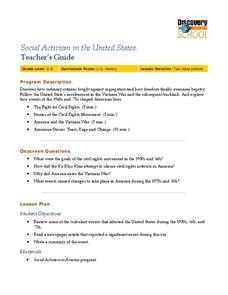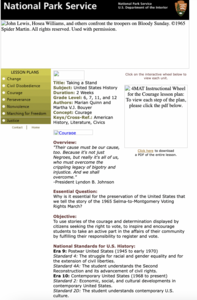Curated OER
Social Activism in the United States
Seventh graders explore the goals of the Civil Rights Movement of the 1950s and 1960s. In this US History lesson plan, 7th graders read a newspaper article that reported a significant event during this era. Students write a summary of...
Curated OER
With Liberty and Justice for All
High schoolers examine the role of Supreme Court justices. In this judicial branch lesson, students consider the civil rights and civil liberties as they investigate Minersville School District v. Gobitis (1940) and West Virginia State...
Curated OER
Black Soldiers in the Civil War
Students explain how a history of slavery distinguishes American society from other societies. They study posters and documents from different eras in our history which document the practice of slavery, and civil rights violations.
University of California
The Civil War: Final Assessment
Pupils discover the true nature and purpose of the Civil War in the eighth and final installment of an informative series. Using primary and secondary documents, history buffs merge social study knowledge with English skills to create a...
Curated OER
Introducing Vocabulary
Eleventh graders create a timeline of events. In this vocabulary instructional activity, 11th graders work in groups to create a timeline of major events that occurred during the Civil Rights era. Students present to class then create a...
Curated OER
Jackie Robinson, Civil Rights Activist
Students analyze the life of Jackie Robinson and determine which characteristics contributed to his success as the baseball player who broke the color barrier and as a political activist.
Facing History and Ourselves
The Legacies of Reconstruction
The final instructional activity in the seven-resource Reconstruction Era collection examines the legacies of Reconstruction. Class members investigate why the period has been called an "unfinished revolution," "a splendid failure," and...
Facing History and Ourselves
A Contested History
Memories of and interpretations of history change—that's the key takeaway from a lesson that has young historians compare the story of the Reconstruction Era as told by the historians of the Dunning School to the view of scholars today...
US House of Representatives
“‘The Negroes’ Temporary Farewell,” Jim Crow and the Exclusion of African Americans from Congress, 1887–1929
Despite some advances made during the Reconstruction Era following the Civil War, the period from 1887 through 1929, African Americans serving in Congress suffered severe setbacks due to Jim Crow Laws and voter suppression. Class members...
Curated OER
Civil Rights Heroes
Students explore the actions of people involved in the Civil Rights Movement. They explore the reasons for the movement and its successes and failures, and explain the sacrifices made by those who participated in the movement.
Curated OER
Civil Rights Leaders
Tenth graders investigate three American leaders from the Civil Rights Movement while they examine the early 1960's and the topic of racial equality. They listen to music from the era, read speeches, and look at images of Martin Luther...
Curated OER
Fight For Your Right - Leading A Revolution of Change
Students examine civil rights. In this civil rights lesson, students research human rights issues of United States history. Students then discuss their research findings and write Bill of Rights statements for the topics they researched.
Curated OER
Social and Cultural Issues in the Civil Rights Movement
Students examine the society and culture during the times of the Civil Rights movement. They view video clips and answer comprehension questions. They work together to research different authors and musicians sharing their information...
Curated OER
Taking a Stand - 1965 Selma-to-Montgomery Voting Rights March
Young scholars examine the 1965 Selma-to-Montgomery Voting Rights March. They view pictures reflecting their perceptions of their most important rights as citizens, write journal responses, create collages illustrating courage, and read...
Alabama Department of Archives and History
African American Life After the Civil War - Sharecropping
What is the sharecropping system? What role did it play in the post-Civil War economy of the South? Who were the sharecroppers? Who employed them? How were they paid? To answer these questions, kids examine a series of sharecropper...
Curated OER
African-American Soldiers After World War I: Had Race Relations Changed?
Students utilize an online database to conduct research and analyze the conditions for African-Americans before and after World War I. They consider the role of the 92nd and 93rd divisions in affecting social change.
City University of New York
African Americans and the Populist Movement
Why did the Populist Party fail to ally itself with African American farmers? To answer this essential question, class members investigate the Populist Era (188-1900) and read an article written by Tom Watson, a Populist leader.
Bill of Rights Institute
Freedom for All?
What did abolitionists have in common with those working for women's rights? How has the Native American struggle for voting rights differed from the struggles of other groups? Class members examine the 15th, 19th, 23rd, 24th, and 26th...
Curated OER
African Americans in Aviation: The 1940s- A Decade of Change
Students investigate African Americans in aviation. In this primary resources lesson, students examine primary resources to research the history of African American in aviation. Students answer two research questions and write an essay...
National Endowment for the Humanities
Slavery and the American Founding: The "Inconsistency Not to Be Excused"
High schoolers examine slavery in the revolutionary and colonial eras of the United States. In this slavery lesson, students investigate the presence of slavery in early America, the language of the Constitution, and the intent of the...
Curated OER
20th Century Civil Disobedience
Students write from varying perspectives in the American South about the civil rights movements in the 1950s. In this civics lesson, students view video clips and take notes. Students discuss the film and listen to a lecture on...
Center for Instruction, Technology, & Innovation
Did African American Lives Improve After Slavery?
The Civil War made slavery illegal, but all ex-slaves were not totally free. Scholars visit eight different classroom stations to uncover life during the Reconstruction Era in America. Groups discover items such as Black Codes, 13th,...
US House of Representatives
A Picture is Worth a Thousand Words
Groups select a photograph from one of the four eras of African Americans in Congress and develop a five-minute presentation that provides background information about the image as well as its historical significance. The class compares...
Center for History Education
African Americans and the Democratic Party
Why did African American voters switch from the Republican Party to the Democratic party during the Depression Era? That is the question young historians attempt to answer as they study primary source documents from the period. The focus...

























